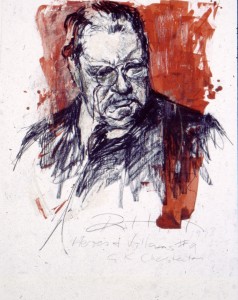
Clayton Chrusch comments on Russell’s post earlier today:
Was Frye being unfair or am I completely naive?
Chesterton wanted to give his audience clear answers and Frye did not. Frye witheld answers because he didn’t want his audience to be stuck with them. Chesterton wanted to give his audience answers, not because he wanted his audience stuck with them and not because he considered himself the greatest authority on anything and not because he considered his own views to be in their final state, but because he thought that, if people were honest, the truth could take care of itself, and that a clear and honest answer backed by reason is as likely to yield truth through participation in a dialectic process as a reticent answer.
Russell responds:
Clayton, I think (and have attempted to argue in an essay a few years ago) that Frye did not see the positive side of the appeal of tradition and orthodoxy in matters of religious belief. Perhaps in part it was his Methodist upbringing, perhaps the spectacle of Catholic fascism, which he comments on several times, but he doesn’t seem to have had much sense of what Chesterton terms “The Romance of Orthodoxy.”
Jean O’Grady has written an interesting account of Frye’s relationship with the United Church of Canada, showing that he didn’t find it much easier to get on with it than with the Catholic Church. She writes “If one searches the diaries and notebooks for evidence of Frye’s attitude to his clerical role, one may well be startled by the negativity of his remarks” (Frye and the Word, p. 176).
